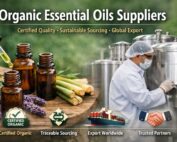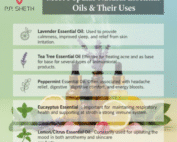Whether you are producing personal care products, therapeutic, or flavor solutions, the demand for quality essential oils is only increasing. But with the increase in demand for essential oils, here is the real question: how do you ensure what’s in the drum is as pure and potent as the distributor said?
This article will walk you through everything you need to check before buying essential oils in bulk.

Why Quality Matters in Essential Oil Procurement
Many buyers assume essential oil quality only affects fragrance. In reality, it influences everything from product stability to global compliance and customer trust.
Here’s why quality should be your first checkpoint:
- Effect on Formulation: Low quality essential oils have been shown to destabilize cosmetic emulsions, or greatly reduce the therapeutic efficacy in aromatherapy, or create allergic reactions.
- Regulatory Compliance: Many of the global markets you may operate in are going to require that each oil be sourced from producers with strict regulation, especially if you are producing pharma or food applications.
- Brand Equity: Poorly constructed products lead to a lack of trust, and less customer retention. This is particularly true in private label products.
Also Read: Essential Oils vs Normal Oils
Key Indicator of High-Quality Essential Oil
a. Transparency of Scientific Name and its Source
Real and proper essential oils must always have their scientific names shown like –
- Lavandula angustifolia instead of just, “lavender.”
- The chemicals which make the oil quality differ depending on the climate and soil. For example Indian peppermint oil is mixed up with chemistry from European types.
This transparency is characteristic of a reputable supplier where the product label contains botanical identity and source area
b. GC-MS Reports & Technical Documents
The most dependable method of oil quality determination is through GC-MS analysis. An authoritative essential oil supplier will give important documentation like:
- GC-MS Report : Verifies chemical composition and detects adulterants.
- Certificate of Analysis : : Describes parameters like refractive index, density, and flash point.
- Material Safety Data Sheet : Essential for shipping and safe handling Provides guidelines for safe handling, transport, and storage.
- P. Sheth Pvt. Ltd. supplies these documents batch-wise to ensure product consistency and quality transparency.
c. Purity and Adulteration Tests
How do you determine if an oil is pure or diluted? Be cautious of:
- Synthetic Additives: Added to simulate natural aroma at lower cost.
- Dilution: At times with carrier oils or solvents.
- Standardized Blends: Very common in perfumes and much less applicable for therapeutic or food-grade use.
Evaluate the supplier’s use of either in-house or third-party lab testing to guarantee purity.
d. Certifications & Standards
Reputable wholesale essential oils have accepted certifications that confirm their quality and compliance:
- Organic Certification
- ISO Standards
- IFRA Compliance for fragrance safety
- FSSAI Approval for food-grade oils
P. Sheth supports its clients by offering oils that are certified, compliant, and documented as per global standards.
Also Read: Which Essential Oil Plants Are Most Popular?
Supplier Reputation and Track Record
Choosing a trusted and experienced essential oil manufacturer is just as important as product testing in bulk orders.
Why supplier reputation matters:
- Provides consistency across batches
- Provides technical support, logistics
- Protects your brand’s value
Tip: Whenever considering a large order, call the supplier and ask their customers for references, case studies or testimonials.
At P. P. Sheth Aromas, we combine a 50‑year legacy with partnerships like BASF, Isobionics and others. From pilot sampling to last‑mile delivery, our team helps brands launch products faster without worrying about purity, compliance, or stockouts.
Packaging and Storage Conditions
Even the finest essential oil will oxidize if it is unsuitable packaged or stored. Quality essential oils should be this:
- Stored in amber glass or aluminum containers to restrict oxidation and degradation from UV exposure.
- Stored in a climate-control environment with minimum light exposure.
P. Sheth has embedded quality preservation into our certified warehousing facilities in Navi Mumbai, all in accordance to optimal storage for essential oil quality.
Also Read: Simple Ways to Use Essential Oils for a Healthier Lifestyle
Request for Samples and Pilot Testing
Before placing a substantial order:
- You should conduct laboratorial analyses or small-batch trials to check that the oil conforms to your standards.
- Request other just smaller samples for in-house laboratory work or to pilot formulations.
- Conduct fragrance compatibility studies and fragrance stability tests.
- Review the GC-MS report for the sample batch.
P.P. Sheth provides pilot samples and full technical assistance for clients to be able to make informed bulk purchasing decisions. We encourage this as best practice and provide technical assistance for sample trials to provide buyers confidence prior to large orders
Conclusion
When buying wholesale essential oils, it’s essential to inspect purity, certifications, and supplier credibility. By implementing quality checks and choosing a trusted partner, you ensure your formulations stay safe, compliant, and effective.
At P. P. Sheth Pvt. Ltd., we simplify bulk sourcing with batch-wise documentation, certified oils, and full technical support.
Looking for a reliable essential oil supplier? Partner with PP Sheth Aromas, a leading essential oil manufacturer in India, trusted for quality and traceability.
Also Read: Struggling to Sleep? Try These Essential Oils Tonight
FAQ
-
How do I ensure that I am buying pure essential oils?
You will be able to also request a GC-MS report, CoA, or request lab tests to verify purity. Look for no cloudiness, and a strong aroma or fragrant smell.
-
What documents should I ask for before buying in bulk?
Always ask for a GC-MS report, CoA, MSDS, and an origin certificate to be completely transparent.
-
May I ask to see samples before I place a large order?
Yes, you can, and should. Suppliers that are responsible will offer sample testing. In fact, some suppliers also offer pilot support so you can test formulations before completing orders.
-
Why choose a certified essential oil manufacturer and distributor in India?
Certified Indian suppliers provide standard quality and documentation transparency, and manufacturers are competitive for bulk orders.
Most Recent Posts









